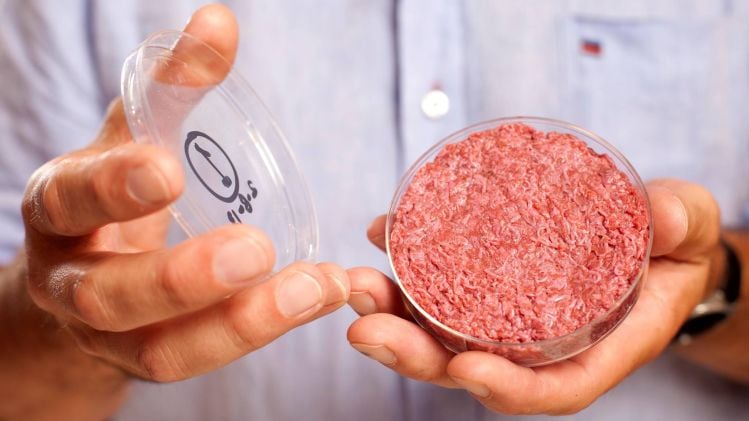The meeting – held at the USDA HQ in Washington, DC - featured speakers including agriculture secretary Sonny Perdue and FDA commissioner Dr Scott Gottlieb, cell-based meat start-ups, cattle ranchers, and consumer groups, with the majority appearing to agree that both FDA and USDA will likely play a role in regulating the technology (with the former handling pre-market safety evaluations, and the latter handle matters thereafter).
"Overall, we’re optimistic that the USDA and FDA will be able to work together to deliver common sense guidance," Brian Spears, co-founder of cell-based meat start-up New Age Meats told us after the meeting: "We hope that our US regulators recognize the desire of other countries to lead in cell cultured meat. If we have a sensible regulatory landscape, we can create safe, high paying jobs — both in research and manufacturing — here in the United States."
Lou Cooperhouse, president at cell-based seafood start-up BlueNalu added that the conversation "has definitely moved forward quite a bit over the past few months, and I do feel confident that the two agencies can and will work together."
As for nomenclature and labeling, however, there were clear divisions between stakeholders, with the National Cattlemen’s Beef Association repeatedly referring to “lab grown fake meat,” while advocates of the technology deployed more neutral terms such as “cell-based meat” or “cell-cultured meat.”
‘If we’re lab grown meat, they are lab-grown Doritos’
While ‘lab-grown’ is clearly not consumer-friendly, it’s also inaccurate, argued Mike Selden, co-founder at cell-based seafood company Finless Foods, who pointed out that foods are routinely tested in the lab before progressing onto full scale manufacturing in a food production facility, from Doritos to beer.
“The term ‘lab grown meat’ is not just wrong but incredibly inaccurate,” argued Selden, who pointed out that Doritos undergo all kinds of ‘lab tests’ for texture and other attributes: “If we’re lab grown meat, they are lab-grown Doritos, and I hope we all understand how silly that sounds.”
Eric Schulze, VP of product and regulation at cell-based meat co Memphis Meats added: “Some terms such as fake, synthetic and artificial meat are not just intended to cast our products in a negative light, they are also false and misleading. We are making real meat and seafood and that’s the whole point. The products we’ll bring to consumers will be produced in food production facilities, not labs.”
‘We have no interest in confusing people’
As for the use of terms such as ‘beef’ or ‘meat’ on food labels, cell-based meat brands will likely want to use these familiar terms in combination with other modifiers (such as cell-based) so that consumers know that they are eating meat, but that it’s been produced without killing animals, said Selden.
“We have no interest in confusing people. We do not want people to accidentally buy what we are producing as a cell based fish producer. We want people to buy with intention, and we do intend to differentiate ourselves from the animal based meats already on the market.
“We believe what we produce has benefits. We’re producing cell based Bluefin tuna [that] has no mercury, no plastic… We’re not using antibiotics, we’re not overfishing the ocean, and we’re not engaging in animal cruelty…”
‘It would be simply dishonest to label it as anything other than meat’
Rebecca Cross, an attorney and co-founder at Outermost House, an incubator for plant-based and cell-cultured food companies, added: “Companies… must be able to use the names of what they are replacing [eg. pork, beef] so consumers have a basis for comparison and can identify products with common language, whether it be plant based milks or meats or the [cell-based] products we are talking about today.”
Besides, it’s “not misleading to a consumer to reference another product,” argued attorney Nigel Barrella: “Producers have a first amendment right to explain their products to consumers in the most natural understandable terms.”
And the term ‘cell-based meat’ is both “clear, factual and inclusive,” and “distinct from plant based proteins and animal based meats,” claimed Schulze from Memphis Meats.
“When we go to market and label this, it would be simply dishonest to label it as anything other than meat,” added Brian Spears, co-founder at cell-based meat co New Age Meats.
However, Michael Hansen at the Consumers Union argued that US adults polled in a nationally representative survey in June strongly preferred terms such as ‘lab-grown meat’ and ‘artificial or synthetic meat’ over ‘cultured meat and ‘clean meat’ (findings not supported by a consumer survey recently released by the Good Food Institute which found that ‘clean meat,’ ‘slaughter-free meat,’ and ‘craft meat’ performed the best with shoppers). Click HERE for the GFI's take on CU's study design.
Are antibiotics used in cell-based meat production?
Another topic over which stakeholders clashed was that of antibiotics, after Ohio State University food science assistant professor Dr Barbara Kowalcyk said she had “significant concerns about some of the claims that are being made about these products…
“One of the things I’ve heard repeatedly is that antibiotics are not going to be used in these products. That is not true.”
She added: “They will not be sterile… the environment in which they are grown is very conducive to the growth of all pathogens, and if that becomes contaminated, there will be contamination in the ultimate product.”
However, GFI senior scientist Dr Liz Specht told FoodNavigator-USA that this was misleading. While antibiotics may well be used in research labs - where “you have culture dishes in an incubator where often dozens of researchers have their hands in there throughout a given day and the cells are undergoing a ton of handling” – they will not be used inside commercial scale cell-based meat bioreactors/cultivators (although factories in which these are housed will need to remain sanitary, as with any food production facility, which may require various cleaning materials), she said.
“When animal cell culture is being conducted in a real, operational, GMP-certified commercial facility operated by trained professionals, antibiotic use is neither necessary nor, for most (if not all) existing therapeutic purposes, acceptable,” explained Dr Specht.
“This is a solved issue in the animal cell culture field, and I have every reason to believe that these safeguards -- operational and process design controls in combination with stringent monitoring and sensitive detection techniques -- will enable the clean meat industry to provide truly clean, safe products without antibiotic use.”
Memphis Meats: We don’t use antibiotics in our production process
Schulze from Memphis Meats told us that the start-up “does not currently use antibiotics in our production process, and we do not intend to use antibiotics in our future commercial products,” while Peter Licari at JUST was equally clear: "We do not use antibiotics.”
Echoing Dr Specht’s comments, Brian Spears at New Age Meats explained: “In the laboratory, when we biopsy a live pig, we use antibiotics because there is bacteria everywhere, but at scale, our processes will be antibiotic free.”
At Finless Foods, antibiotics are a no, no, clarified Mike Selden: “For fish, antibiotics kills our cell culture, so it’s not something we use at any point in the production process.”
What about contamination?
Asked about Dr Kowalcyk’s comments about contamination, Dr Specht added: “Any cell culture platform is subject to contamination by adventitious agents. This is true for animal cell culture as well as for other forms of cell culture routinely used in the food industry (eg. fermentation).
“Because of this, there are very well established techniques for monitoring and early detection of contamination (in which case the batch will be scrapped), as well as operational and bioprocess design controls that drastically reduce the chances of contamination.”
Here are some quotes that caught our eye from stakeholders at the meeting:
Sonny Perdue, USDA: We want to be true world leaders on this topic … I’m glad to see the excitement over [this] new technology… It’s important that we have a framework that encourages innovation and new technology while we provide the responsibility of a public, safe, wholesome, and nutritious food supply.
Dr Scott Gottlieb, FDA: We fully anticipate that both FDA and USDA will have active roles in the regulatory oversight of cell cultured products.
Jack Bobo, Intrexon: People have never cared more or known less about how their food is produced… people love innovation almost as much as they despise change, and there’s no place they despise change more than in the food they eat … but if we don’t change how we produce food, everything will change… We need to produce 50% more protein by 2050 and if 100% of that was cell based, it would not impact a single livestock producer on the planet.
Sarah Sorscher, CSPI: [The GRAS process is] particularly inappropriate for cultured meat … Congress should create a pathway for all new technology, but absent this we’d support the use of the FDA’s food additive petition process to ensure that every component that makes its way into the final product has been independently vetted.
Alain Rostain, Simple Foods Collaborative: The label must make it perfectly clear that it’s fish to avoid serious dangers to those with fish allergies. The term ‘cultured’ will not work for fish – it means fish raised on farms.
Eric Schulze, Memphis Meats: Without a clear, predictable, and timely framework, this industry cannot succeed. Any delays in moving forward would jeopardize the US’s standing in the world as the leader in protein production and responsible, science-based food innovation.
We are confident any potential risk can be adequately controlled through well-established methods, including characterization and qualification of cell lines and raw material inputs, aseptic and closed-containment processes, manufacturing controls, and monitoring and verification.
After pre-market safety has been established [by the FDA], USDA should regulate cell-based meat products, as it does with all other meat and poultry products, applying relevant findings from FDA’s safety evaluation.
Kevin Kester, National Cattlemen’s Beef Association The FDA has consistently show it is unwilling or unable to enforce product labeling standards. The agency has turned a blind eye to labeling abuses from fake milk manufacturers for nearly three decades. Lab grown fake meat manufacturers must not be permitted to use the term beef and any associated nomenclature. It should only be applicable to livestock raised by farmers and ranchers.
Peter Licari, JUST We believe there are three pillars critical in appropriate, sound regulatory oversight: (1) the starting Master Cell Bank is well characterized and free of adventitious agents, (2) the production process is consistent and well-controlled; and (3) the final product is well characterized and comparable in all material respects to the conventionally produced version of the food product.
With regard to labeling… we believe there should be both a regulatory nomenclature (e.g., statement of identity) and consumer-facing nomenclature that sufficiently differentiates cell-cultured products from traditional meat products but appropriately acknowledges these products as meat.
We propose that labels for cultured meat products include the following elements: (1) On the front and center of the label: the name of the brand, for example, Sunshine Meat Co; and (2) below the brand name: a statement of identity which indicates that the product is cultured, as well as the species from which the product is derived, for example, ‘Cultured Chicken Breast.”
Jessica Almy, GFI – As long as consumers are not misled, these products are not mislabeled. We have every expectation that cultured meat companies will have incentives to set their products apart when they are first introduced into the marketplace … Over time we think it’s important to see whether the production process is important to consumers…
We are encouraged by the comments of both Secretary Perdue and Commissioner Gottlieb who have outlined a regulatory process with ‘bright lines...’No new regulation is needed. The presentations today have shown that the FDA has a clear and strong precedent to address safety premarket. The FDA can provide a single point of entry for regulation.
Danni Beer, USCA: We believe that cell-cultured proteins should be regulated as strictly as beef, but that these products should have their own food category and inspection process, not using our stamp or shield. The alternative protein industry should not be allowed to villainize the beef cattle industry. We should have standards of identity to establish these products as different from meat or beef…
Consumers … think of what we’re doing as families taking care of the land, taking care of the cattle everyday … they don’t think about somebody putting a group of cells together and growing a new product. That’s not beef.
Brian Spears, New Age Meats: We’ve been contacted by representatives from the governments of China, Singapore, India, and others. They say can you please set up your company in our country, we’ll ensure a clear regulatory pathway. I say no, I’m an American, I want to do this here. The question is, will you let me? Will you let us create safe high paying American jobs both in R&D and manufacturing?
Elan Abrell, Good Food Institute: [Addressing comments suggesting that cells genetically engineered to be immortal – or proliferate indefinitely – could behave like cancer cells and present risks] Some proliferative cells can be immortalized without genetic engineering. There are so-called footprint free methods that do not introduce foreign DNA into the cells, but do reprogram the cells into a pluripotent state so they are capable of multiple rounds of division and differentiation into multiple tissue types.
If genetically engineered cells were used in the future, genetically engineered cultured meat cell lines could be regulated by the FDA under existing guidelines.

Interested in cell-based meat? The Industrializing Cell Based Meats Summit in San Francisco Feb 5-7, 2019, features speakers from all the key stakeholders, including Memphis Meats, Mosameat, JUST, BlueNalu, Higher Steaks, Integriculture, Aleph Farms, New Age Meats, Finless Foods, Future Meat Technologies, the GFI, the Cellular Agriculture Society and more.
Get more details HERE.




